
An introduction to Hydromechanics.
- Subject:
- Engineering
- Material Type:
- Textbook
- Author:
- Gangfeng Ma
- Date Added:
- 03/25/2020
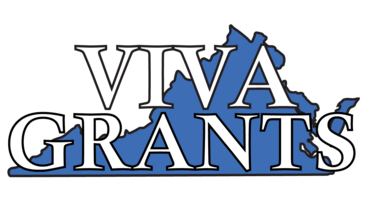
As part of VIVA’s Open and Affordable Course Content Program, VIVA provides two grant opportunities, the VIVA Open Adopt Grants and the VIVA Open Course Grants. These grants encourage the use of open and affordable course content, including textbooks, software, and other course materials, by providing funding for instructors to adopt, adapt, and create course content that can be made available to students for no or very little cost.
This endorsement is applied to VIVA Open Course Grant projects.

An introduction to Hydromechanics.
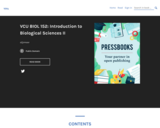
This textbook has been modified from OpenStax Biology by faculty at Virginia Commonwealth University. The goal was to provide students with a complete textbook with interactive features (reading quizzes, videos, links) that was highly engaging and, of course, at no cost to the students.
1. 1.1 Processes and Patterns of Evolution
2. 1.2 Evidence of Evolution
3. 1.3 Mutations
4. 2.1 Population Genetics
5. 2.2 Population Evolution
6. 2.3 Adaptive Evolution
7. 3.1 Speciation: Allopatric and Sympatric
8. 3.2 Speciation Isolation and Adaptation
9. 3.3 Reconnection and Speciation Rates
10. 4.1 Evolution and Classification
11. 4.2 Determining Phylogenetic Connections
12. 5.1 Prokaryotic Cell Structures
13. 5.2 Prokaryotic Growth & Metabolism
14. 5.3 Prokaryotic Diversity
15. 6.1 Evolution of Eukaryotic Cells
16. 6.2 Evolution of Simple Multicellularity
17. 6.3 Challenges to Complex Multicellularity
18. 7.1 Characteristics of Fungi
19. 7.2 Ecology of Fungi
20. 7.3 Classifications of Fungi
21. 7.4 Fungal Parasites and Pathogens
22. 7.5 Importance of Fungi in Human Life
23. 8.1 Land Plant Ancestors
24. 8.2 Adaptations of Plants to Land
25. 8.3 Seedless Non-Vascular Plants
26. 8.4 Seedless Vascular Plants
27. 8.4 Seedless Vascular Plants
28. 8.5 Seed Plants: Gymnosperms
29. 8.6 Seed Plants: Angiosperms
30. 9.1 Shoot Growth and Development
31. 9.2 Water Transport in Plants
32. 9.3 Sugar Transport in Plants
33. 10.1 Features of the Animal Kingdom
34. 10.2 Features Used to Classify Animals
35. 10.3 Early Animals
36. 10.4 Neurons and Glial Cells
37. 11.1 Types of Skeletons
38. 11.2 Muscles and Movement
39. 11.3 Protostomes
40. 11.4 Deuterostomes
41. 12.1 Evolution of Fishes
42. 12.2 Systems of Gas Exchange
43. 12.3 Evolution of Tetrapods
44. 12.4 Overview of the Circulatory System
45. 12.5 Fertilization in Animals
46. 12.6 Homeostasis in Animals
47. 13.1 Population Dynamics
48. 13.2 Population Growth
49. 13.3 Population Dynamics
50. 13.4 Interspecific Interactions
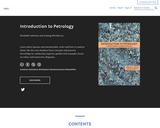
Short Description:
Learn about igneous and metamorphic rocks (and how to analyze them), the fun way! Students learn concepts and practice knowledge by conducting inquiries guided with examples based on videos and interactive diagrams.
Word Count: 20627
(Note: This resource's metadata has been created automatically by reformatting and/or combining the information that the author initially provided as part of a bulk import process.)
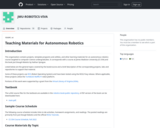
This organization contains projects, template programs and utilities, and other learning materials for an autonomous robotics course targeted to computer science undergraduates. It corresponds with a course at James Madision University (CS 354) and the book, Just Enough Robotics, by Nathan Sprague.
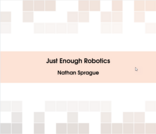
This book is intended to be an accessible introduction to key algorithmic concepts in autonomousrobotics targeted toward undergraduate computer science students. It is not intended to be an exhaustive reference or to provide rigorous mathematical foundations, derivations or proofs. The focus is on clear explanations with extensive examples and visualizations.This book uses a Python-based pseudocode that is generally very close to executable Python. The author has attempted to steer clear of any idiomatic Python constructs so that the algorithm listings should be easy to follow even for those without a background in the Python language.This book is a work in progress! It covers several of the central algorithmic ideas in autonomousrobotics, but there are still significant missing pieces. In particular, there is currently no coverage ofparticle filters, mapping algorithms, or simultaneous localization and mapping (SLAM). The author welcomes contributions.Table of Contents:Chapter 1: Controlling Physical SystemsChapter 2: Coordinate FramesChapter 3: Path PlanningChapter 4: Probabilistic LocalizationBibliographyIndex
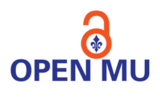
This online introductory cognitive psychology course was designed in a modular format that students work through from beginning to end. Each topic has corresponding OER material for students to review (most often readings and/or videos), a video lecture (not included), a brief quiz to check understanding of content (not included) , and various virtual cognitive psychology experiments, discussions and brief writing assignments. Currently there is no cumulative exam for the course, In lieu of an exam, students write a reflection journal, with entries due at the end of each module (five in total). These entries consist of a response to a prompt that encourages students to link theories and findings learned in the module to their daily lives.

Neuroscience for Pre-Clinical Students covers neuroenergetics, neurotransmitters, neuropeptides, and selected amino acid metabolism and degradation. This USMLE-aligned text is designed for a first-year undergraduate medical course and is meant to provide the essential biochemical information from these content areas in a concise format to enable students to engage in an active classroom. Hence, it does not cover neurophysiology and neuroanatomy; and clinical correlates and additional application of content are intended to be provided in the classroom experience. The text assumes that the students will have completed medical school prerequisites (including the MCAT) in which they will have been introduced to the most fundamental concepts of biology and chemistry that are essential to understand the content presented here. With its focus on high-yield concepts, this resource will assist the learner later in medical school and for exam preparation.
The 49-page text was created specifically for use by pre-clinical students at Virginia Tech Carilion School of Medicine and was based on faculty experience and peer review to guide development and hone important topics.
Available Formats
ISBN 978-1-949373-80-6 (PDF)
ISBN 978-1-949373-81-3 (ePub)
ISBN 978-1-949373-84-4 (print) https://www.amazon.com/Neuroscience-Pre-Clinical-Students-REN%C3%89E-LECLAIR
ISBN 978-1-949373-82-0 (Pressbooks) https://pressbooks.lib.vt.edu/neuroscience
Also available via LibreTexts: https://med.libretexts.org/@go/page/35685
How to Adopt this Book
Instructors reviewing, adopting, or adapting parts or the whole of the text are requested to register their interest at: https://bit.ly/interest-preclinical.
Instructors and subject matter experts interested in and sharing their original course materials relevant to pre-clinical education are requested to join the instructor portal at https://www.oercommons.org/groups/pre-clinical-resources/10133.
Features of this Book
1. Detailed learning objectives are provided at the beginning of each subsection;
2. High resolution, color contrasting figures illustrate concepts, relationships, and processes throughout;
3. Summary tables display detailed information;
4. End of chapter lists provide additional sources of information; and
5. Accessibility features including structured heads and alternative-text provide access for readers accessing the work via a screen-reader.
Table of Contents
1. Neuron and astrocyte metabolism
2. Neurotransmitters — ACh, glutamate, GABA, and glycine
3. Neuropeptides and unconventional neurotransmitters
4. Amino acid metabolism and specialized products
Suggested Citation
LeClair, Renée J., (2022). Neuroscience for Pre-Clinical Students, Blacksburg, VA: Virginia Tech Publishing. https://doi.org/10.21061/neuroscience. Licensed with CC BY NC-SA 4.0.
About the Author
Renée J. LeClair is an Associate Professor in the Department of Basic Science Education at the Virginia Tech Carilion School of Medicine, where her role is to engage activities that support the departmental mission of developing an integrated medical experience using evidence-based delivery grounded in the science of learning. She received a Ph.D. at Rice University and completed a postdoctoral fellowship at the Maine Medical Center Research Institute in vascular biology. She became involved in medical education, curricular renovation, and implementation of innovative teaching methods during her first faculty appointment, at the University of New England, College of Osteopathic Medicine. In 2013, she moved to a new medical school, University of South Carolina, School of Medicine, Greenville. The opportunities afforded by joining a new program and serving as the Chair of the Curriculum committee provided a blank slate for creative curricular development and close involvement with the accreditation process. During her tenure she developed and directed a team-taught student-centered undergraduate medical course that integrated the scientific and clinical sciences to assess all six-core competencies of medical education.
Accessibility Note
The University Libraries at Virginia Tech and Virginia Tech Publishing are committed to making its publications accessible in accordance with the Americans with Disabilities Act of 1990. The HTML (Pressbooks) and ePub versions of this book utilize header structures and include alternative text which allow for machine-readability.
Please report any errors at https://bit.ly/feedback-preclinical
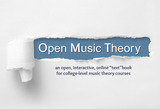
Version 2
Short Description:
Open Music Theory is a natively-online open educational resource intended to serve as the primary text and workbook for undergraduate music theory curricula. OMT2 provides not only the material for a complete traditional core undergraduate music theory sequence (fundamentals, diatonic harmony, chromatic harmony, form, 20th-century techniques), but also several other units for instructors who have diversified their curriculum, such as jazz, popular music, counterpoint, and orchestration. This version also introduces a complete workbook of assignments.
Long Description:
Open Music Theory Version 2 (OMT2) is an open educational resource intended to serve as the primary text and workbook for undergraduate music theory curricula. As an open and natively-online resource, OMT2 is substantially different from other commercially-published music theory textbooks, though it still provides the same content that teachers expect from a music theory text.
OMT2 has been designed inclusively. For us, this means broadening our topics beyond the standard harmony and atonal theory topics to include fundamentals, musical form, jazz, pop, and orchestration. And within those traditional sections of harmony and atonal theory, the authors have deliberately chosen composers who represent diverse genders and races. The book is accessible. And perhaps most importantly, the book is completely free and always will be.
The text of the book is augmented with several different media: video lessons, audio, interactive notated scores with playback, and small quizzes are embedded directly into each chapter for easy access.
OMT2 introduces a full workbook to accompany the text. Almost every chapter offers at least one worksheet on that topic. Some chapters, especially in the Fundamentals section, also collect additional assignments that can be found on other websites.
Version 2 of this textbook is collaboratively authored and edited by Mark Gotham, Kyle Gullings, Chelsey Hamm, Bryn Hughes, Brian Jarvis, Megan Lavengood, and John Peterson.
Word Count: 268272
(Note: This resource's metadata has been created automatically by reformatting and/or combining the information that the author initially provided as part of a bulk import process.)
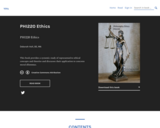
This book provides a systemic study of representative ethical concepts and theories and discusses their application to concrete moral dilemmas.
The twelve lessons for SOWK 621.01: Research I: Basic Research Methodology as previously taught by Dr. Matthew DeCarlo at Radford University. Dr. DeCarlo and his team developed a complete package of materials that includes a textbook, ancillary materials, and a student workbook as part of a VIVA Open Course Grant.
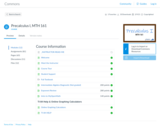
There are four primary focus areas of this course - 1) Relations and Functions, 2) Polynomial and Rational Functions, 3) Exponential and Logarithmic Functions and 4) Systems of equations.
Precalculus 1 (MTH 161) was produced by the Virginia Community College System (VCCS) as an online Open Educational Resources (OER) course in partnership with three Community Colleges: J. Sargeant Reynolds, Tidewater, and John Tyler.
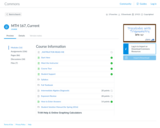
There are nine focus areas of this course - 1) Relations and Functions, 2) Polynomial and Rational Functions, 3) Exponential and Logarithmic Functions, 4) Systems of equations, 5) Trigonometric Functions, 6) Analytic Trigonometry, 7) Applications of Trigonometry, 8) Conics and 9) Sequences and Series.
Precalculus with Trigonometry (MTH 167) was produced by the Virginia Community College System (VCCS) as an online Open Educational Resources (OER) course in partnership with three Community Colleges: J. Sargeant Reynolds, Tidewater, and John Tyler.
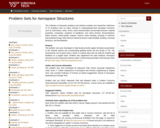
This collection of interactive problems and solutions includes over twenty-five collections of 3-5 problems each on topics relevant to undergraduate-level aerospace structures such as load factors, strain, stress, stress transformation and principal stresses, material properties, composites, equations of equilibrium, Airy stress function, thermoelasticity, failure theories, elastic-plastic analysis, fracture, beam bending, principal of minimum total potential energy, finite element method for beams, plate bending, buckling, structural dynamics, and aeroelasticity.
The problem sets were developed to help faculty provide regular formative assessments to the students without any corresponding grading burden (for the faculty or TA). The assessments can be given twice a week in a typical class and can help the students get feedback on a regular basis.
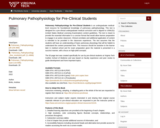
Pulmonary Pathophysiology for Pre-Clinical Students is an undergraduate medical-level resource for foundational knowledge of pulmonary pathophysiology. This text is designed for a pre-clinical undergraduate medical curriculum and is aligned to USMLE(r) (United States Medical Licensing Examination) content guidelines. The text is meant to provide the essential information in a concise format that would allow learner preparation to engage in an active classroom. Clinical correlates and additional application of content is intended to be provided in the classroom experience. The text assumes that the students will have an understanding of basic pulmonary physiology that will be helpful to understand the content presented here. This resource should be assistive to the learner later in medical school and for exam preparation given the material is presented in a succinct manner, with a focus on high-yield concepts.
The 82-page text was created specifically for use by pre-clinical students at Virginia Tech Carilion School of Medicine and was based on faculty experience and peer review to guide development and hone important topics.
Available Formats
ISBN 978-1-957213-08-8 (PDF)
ISBN 978-1-957213-11-8 (ePub) https://doi.org/10.21061/pulmonarypathophysiology
ISBN 978-1-957213-09-5 (print) https://www.amazon.com/Pulmonary-Pathophysiology-Pre-Clinical-Students-Andrew/dp/1957213094
ISBN 978-1-957213-10-1 (Pressbooks)
https://pressbooks.lib.vt.edu/pulmonarypathophysiology
Also available via LibreTexts: https://med.libretexts.org/@go/page/34444
How to Adopt this Book
Instructors reviewing, adopting, or adapting parts or the whole of the text are requested to register their interest at: https://bit.ly/interest-preclinical.
Instructors and subject matter experts interested in and sharing their original course materials relevant to pre-clinical education are requested to join the instructor portal at https://www.oercommons.org/groups/pre-clinical-resources/10133.
Features of this Book
1. Detailed learning objectives are provided at the beginning of each chapter;
2. High resolution, color contrasting figures illustrate concepts, relationships, and processes throughout;
3. Subsection summary tables
4. End of chapter lists provide additional sources of information; and
5. Accessibility features including structured heads and alternative-text provide access for readers accessing the work via a screen-reader.
Table of Contents
1: The Obstructive Lung Diseases
2: Upper Airway Infections
3: Lower Airway Infections
4: The Restrictive Lung Diseases
5: Acute Respiratory Distress Syndrome
6: Lung Cancer
7: Pulmonary Embolism
8: Immunological Diseases of the Lung
9: Pleural Disease
Suggested Citation
Binks, Andrew., (2022). Pulmonary Pathophysiology for Pre-Clinical Students, Roanoke: Virginia Tech Carilion School of Medicine. https://doi.org/10.21061/pulmonarypathophysiology. Licensed with CC BY NC-SA 4.0.
Other Titles in This Series
LeClair, R., (2021) Cell Biology, Genetics, and Biochemistry for Pre-Clinical Students
LeClair, R., (2022) Neuroscience for Pre-Clinical Students
Binks, A., (2022) Cardiovascular Pathophysiology for Pre-Clinical Students
Binks, A., (2022) Pulmonary Physiology for Pre-Clinical Students
About the Author
Dr. Andrew Binks is a cardiopulmonary physiologist who gained his BSc (Hons) in Physiological Sciences at the University of Newcastle upon Tyne, then a MSc in Human and Applied Physiology from King’s College, London. He returned to Newcastle to do his PhD and study the underlying physiological mechanisms of dyspnea, the cardinal symptom of cardiopulmonary disease. He continued investigating dyspnea at Harvard School of Public Health as a postdoctoral fellow and then as a research scientist. After seven years at Harvard, Andrew took his first faculty position at the University of New England where he taught cardiovascular and pulmonary physiology to health profession and medical students. He continued to teach medical students their heart and lung physiology after moving to the University of South Carolina’s Medical School in Greenville where he also directed the school’s heart and lung pathophysiology courses. Andrew currently teaches heart and lung physiology and pathophysiology at Virginia Tech Carilion School of Medicine, directs the heart and lung pathophysiology course and has also served as the departmental director of faculty development.
In his two decades of teaching medical physiology, Andrew has regularly drawn upon his dyspnea research experience to generate an active, clinically focused approach to medical education. This book is part of that approach and supports students preparing for class with the basic information with the intention to apply and contextualize that information in a guided case-based classroom experience.
Andrew has published numerous peer-reviewed research papers and book chapters about dyspnea and about contemporary medical education. He has also given keynote presentations, faculty workshops and international webinars to promote effective medical education for the modern adult learner.
Accessibility Note
The University Libraries at Virginia Tech and Virginia Tech Publishing are committed to making its publications accessible in accordance with the Americans with Disabilities Act of 1990. The HTML (Pressbooks) and ePub versions of this book utilize header structures and include alternative text which allow for machine-readability.
Please report any errors at https://bit.ly/feedback-preclinical
URI
http://hdl.handle.net/10919/105411
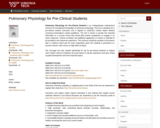
Pulmonary Physiology for Pre-Clinical Students is an undergraduate medical-level resource for foundational knowledge of pulmonary physiology. This text is designed for a pre-clinical medical curriculum and is aligned to USMLE(r) (United States Medical Licensing Examination) content guidelines. The text is meant to provide the essential information in a concise format that would allow learner preparation to engage in an active classroom. Clinical correlates and additional application of content is intended to be provided in the classroom experience. This resource should be assistive to the learner later in medical school and for exam preparation given the material is presented in a succinct manner, with a focus on high-yield concepts.
The 101-page text was created specifically for use by pre-clinical students at Virginia Tech Carilion School of Medicine and was based on faculty experience and peer review to guide development and hone important topics.
Available Formats
ISBN 978-1-957213-12-5 (PDF)
ISBN 978-1-957213-14-9 (ePub) https://doi.org/10.21061/pulmonaryphysiology
ISBN 978-1-957213-13-2 (print) https://www.amazon.com/Pulmonary-Physiology-Pre-Clinical-Students-Andrew/dp/1957213132
ISBN 978-1-957213-15-6 (Pressbooks)
https://pressbooks.lib.vt.edu/pulmonaryphysiology
Also available via LibreTexts: https://med.libretexts.org/@go/page/34378
How to Adopt this Book
Instructors reviewing, adopting, or adapting parts or the whole of the text are requested to register their interest at: https://bit.ly/interest-preclinical.
Instructors and subject matter experts interested in and sharing their original course materials relevant to pre-clinical education are requested to join the instructor portal at https://www.oercommons.org/groups/pre-clinical-resources/10133.
Features of this Book
1. Detailed learning objectives are provided at the beginning of each chapter;
2. High resolution, color contrasting figures illustrate concepts, relationships, and processes throughout;
3. Subsection summary tables
4. End of chapter lists provide additional sources of information; and
5. Accessibility features including structured heads and alternative-text provide access for readers accessing the work via a screen-reader.
Table of Contents
1: Fundamentals
2: Mechanics of the Lungs
3: Lung Volumes and Compliance
4: Distribution of Ventilation
5: Airflow and Airway Resistance
6: Dynamic Airway Compression
7: Fundamentals of Gas Exchange
8: Perfusion and Diffusion Limitations in Gas Exchange
9: Pulmonary Blood Flow
10: Pulmonary Capillaries and Non-Ventilatory Function
11: Arterial CO₂ and Ph
12: Alkalosis and Acidosis
13: Ventilation and Perfusion
14: The Alveolar Gas Equation and Alveolar-Arterial PO₂ Difference
15: Pulmonary Shunts
16: Gas Transport
17: Control of Breathing
18: Dyspnea
Suggested Citation
Binks, Andrew., (2022). Pulmonary Physiology for Pre-Clinical Students, Roanoke: Virginia Tech Carilion School of Medicine. https://doi.org/10.21061/pulmonaryphysiology. Licensed with CC BY NC-SA 4.0.
Other Titles in This Series
LeClair, R., (2021) Cell Biology, Genetics, and Biochemistry for Pre-Clinical Students
LeClair, R., (2022) Neuroscience for Pre-Clinical Students
Binks, A., (2022) Cardiovascular Pathophysiology for Pre-Clinical Students
Binks, A., (2022) Pulmonary Pathophysiology for Pre-Clinical Students
About the Author
Dr. Andrew Binks is a cardiopulmonary physiologist who gained his BSc (Hons) in Physiological Sciences at the University of Newcastle upon Tyne, then a MSc in Human and Applied Physiology from King’s College, London. He returned to Newcastle to do his PhD and study the underlying physiological mechanisms of dyspnea, the cardinal symptom of cardiopulmonary disease. He continued investigating dyspnea at Harvard School of Public Health as a postdoctoral fellow and then as a research scientist. After seven years at Harvard, Andrew took his first faculty position at the University of New England where he taught cardiovascular and pulmonary physiology to health profession and medical students. He continued to teach medical students their heart and lung physiology after moving to the University of South Carolina’s Medical School in Greenville where he also directed the school’s heart and lung pathophysiology courses. Andrew currently teaches heart and lung physiology and pathophysiology at Virginia Tech Carilion School of Medicine, directs the heart and lung pathophysiology course and has also served as the departmental director of faculty development.
In his two decades of teaching medical physiology, Andrew has regularly drawn upon his dyspnea research experience to generate an active, clinically focused approach to medical education. This book is part of that approach and supports students preparing for class with the basic information with the intention to apply and contextualize that information in a guided case-based classroom experience.
Andrew has published numerous peer-reviewed research papers and book chapters about dyspnea and about contemporary medical education. He has also given keynote presentations, faculty workshops and international webinars to promote effective medical education for the modern adult learner.
Accessibility Note
The University Libraries at Virginia Tech and Virginia Tech Publishing are committed to making its publications accessible in accordance with the Americans with Disabilities Act of 1990. The HTML (Pressbooks) and ePub versions of this book utilize header structures and include alternative text which allow for machine-readability.
Please report any errors at https://bit.ly/feedback-preclinical
URI
http://hdl.handle.net/10919/105410

The Python Jubilee Project adapted various available OER into a single resource for an introductory course in programming in Python. Dr. Showalter arranged the materials into weekly course modules that can be accessed and completed by enrolled students.
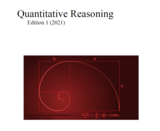
Quantitative Reasoning was designed to align with the objectives of the Virginia CommunityCollege System course MTH 154 Quantitative Reasoning.Table of Contents include:Chapter 1: Ratio and Proportional ReasoningChapter 2: Mathematical ModelingChapter 3: Personal FinanceChapter 4: Validity Studies

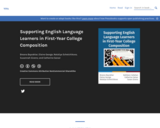
Supporting English Language Learners in First-Year College Composition is organized around five key essays, selected to coordinate with the essay styles commonly taught in first-year/first-semester composition courses.
This organization is planned to offer instructors the flexibility to best support the pacing of the composition course. There are 2 expository, 1 narrative, and 2 argument essays. Each module includes one essay, with accompanying activities and supporting materials.
Expository: Sweet, Sour & Resentful
Expository: Why Rituals Are Good
Narrative: Prison to Professor
Argument: Fake News
Argument: Misinformation

Sustainable Property Management is a 150-page, peer-reviewed open textbook intended for students majoring in property management and real estate at both the undergraduate and graduate levels. It can be incorporated into an existing property management operations course or used for a stand-alone course focused on sustainable property management. Although sustainability, as used in the real estate context, is about preserving the environment, it is about more than that. In sustainable property management, sustainability encompasses three spheres—environmental, social, and economic. Sustainable property management is about reconciling these three spheres throughout the operations and maintenance phases of the building lifecycle in such a way that a balance is achieved between economic development and the protection of environmental and social resources.
This textbook explains how ecologically sustainable concepts may be implemented throughout the property management operation functions while also considering the other spheres of sustainability. It also incorporates the theme of sustainable building practices as a human science as well as a building science by highlighting motivations and impacts to various stakeholders. The author draws on industry examples to illustrate these concepts and provides many experiential activities through which students can apply these concepts.
ISBN
ISBN PDF 978-1-957213-38-5
ISBN Pressbooks 978-1-957213-40-8
ISBN ePub 978-1-957213-39-2
ISBN Print (color) 978-1-957213-37-8
URL to order print version: https://www.amazon.com/dp/195721337X
Customizable class slides for this book are available at http://hdl.handle.net/10919/113422.
Table of Contents
Chapter 1: Introduction to Sustainable Property Management
Chapter 2: The Three Spheres of Sustainable Property Management
Chapter 3: Stakeholder Motivations for Sustainable Property Management Practices
Chapter 4: Sustainable Building Maintenance and Repair Practices
Chapter 5: The Intersection of Sustainable Property Management and Risk Management
Chapter 6: Integrating Sustainable Practices into Marketing and Leasing
Chapter 7: Financial Evaluation of Sustainable Building Initiatives
Chapter 8: Human Health Considerations
Find, Adapt, and Share Resources
Customizable class slides for this book are available at: http://hdl.handle.net/10919/113422.